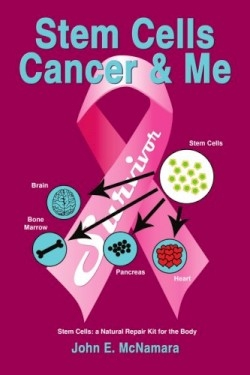Stem Cells, Cancer & Me
John McNamara is a tenacious man. He held his own through fatherhood decades in the workplace and service in the Korean War but the supreme challenge of his life began with the words “‘Your blood work shows the possibility of cancer.’” Daily concerns evaporate with the assumption of Patient Status. An illness-fighting strategy of information immersion rather than denial makes a big difference as do efforts of the memoirist’s supportive wife Marian and adult children who make many flights to North Carolina. McNamara is process-focused. He researches listens and notes all relevant facts. He picks up the specialized lingo of treatment professionals. An autologous stem cell transplant using pre-chemo harvested bone marrow was the biological foundation of his program.
Cancer treatment is loaded with unavoidable waits: exam rooms open slowly intravenous solutions drip through the hours. The science of procedures is explained in understandable laymen’s terms. Removing the mystery from medicine reduces the attendant fear. McNamara notes that chemotherapy’s notorious side-effects have relatively lessened though he describes with folksy flair one intensely negative session: “…as if the devil had taken over my being and body and used it to test auto accidents.”
This was the recent struggle of a highly social retiree and a joiner of several charities. In 2006 McNamara finished five years as the elected Post Commander for the VFW in Dunn North Carolina. He and Marian whom he refers to in laudable terms and praises as an outstanding “Caregiver” are transplants from New England. Married over forty years they appreciate each other’s quirks and individual ways. Both McNamaras hate their clock radio’s loud rock music but they never oversleep. After weeks languishing in transplant recovery the memoirist takes pleasure in signs of home. He creates a strong visual impression of Marian: “She was sipping her favorite morning elixir of life coffee puffing on Lark 100s and reading her author of choice Danielle Steele.”
Attention to the least detail can save a patient’s life—no other single individual can know as much about the case particulars of a patient being treated in multiple hospital facilities than the patient themselves. Meticulous notes and active interest are extensions of the immune system. That sort of precision can be a detriment however to the flow of personal narrative. It’s overkill to mention which level of a parking garage one parked on or the exact measure of orange juice a given breakfast featured in 2001. The flipside of the issue is the utter confidence that no medical fact of importance passed undocumented. Stem Cells Cancer & Me is a line-item roadmap of what to expect next from the acceptance of unwelcome news to the triumphant milestone of release. Those facing a similar battle can certainly ready themselves with this book.
Reviewed by
Todd Mercer
Disclosure: This article is not an endorsement, but a review. The publisher of this book provided free copies of the book and paid a small fee to have their book reviewed by a professional reviewer. Foreword Reviews and Clarion Reviews make no guarantee that the publisher will receive a positive review. Foreword Magazine, Inc. is disclosing this in accordance with the Federal Trade Commission’s 16 CFR, Part 255.

